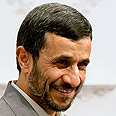
Israeli delegation dispatched to US to argue that Iran still pursuing bomb
Intelligence experts at end of week-long mission to Washington to counter findings of NIE report claiming Iran no longer developing nuclear weapons
Israel has dispatched an unscheduled delegation of intelligence officials to the US to try to convince it that Iran is still trying to develop nuclear weapon - contrary to the findings of a recent US intelligence report, security officials say.
The delegation, which set off last week on its unscheduled mission, will wind up its visit this week, the officials said. They spoke on condition of anonymity because they were not authorized to discuss the matter with the media.
It was not clear what type of material the Israeli delegation - for the most part military intelligence officers - presented to US officials.
The US and Israel will also hold additional joint formal meetings on the matter in coming weeks, the Israeli officials said. Israel will use these forums to try to persuade the Americans that Iran is trying to development nuclear weapons, and intends to present information classified as top secret for security reasons, the officials said.
The US report, released earlier this month, concludes Iran halted its weapons development program in 2003 and that the program remained frozen through at least through the middle of this year. The findings reversed a key conclusion from a 2005 intelligence report that Iran was developing a bomb.
Israeli officials who have reviewed all known intelligence on Iran's nuclear activities have concluded that Iran did in fact suspend its atomic weapons development in 2003, after the US invaded Iraq, the Israeli security officials said. But Israel is convinced the Iranians set up a new production line whose details aren't known fully to Western intelligence agencies, they said.
Israel considers the regime in Tehran to be its biggest threat because of its nuclear ambitions, its long-range missile program and repeated calls by its president, Mahmoud Ahmadinejad, to wipe Israel off the map.
Iran says its nuclear program is designed to produce energy.
On Saturday, a senior Israeli Cabinet minister who once headed Israel's internal security agency issued the country's harshest criticism yet of the US intelligence report, calling it a ''misconception'' that threatened to lead to a surprise regional war.
''Something went wrong in the American blueprint for analyzing the severity of the Iranian nuclear threat,'' Public Security Minister Avi Dichter said in a speech.










